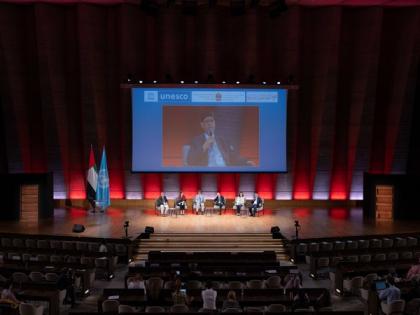ALA, UNESCO highlight role of historical dictionaries
By ANI | Updated: May 24, 2025 22:48 IST2025-05-24T22:40:49+5:302025-05-24T22:48:00+5:30
Paris [France], May 24 (ANI/WAM): The Arabic Language Academy (ALA) in Sharjah, in collaboration with UNESCO, held a specialised ...

ALA, UNESCO highlight role of historical dictionaries
Paris [France], May 24 (ANI/WAM): The Arabic Language Academy (ALA) in Sharjah, in collaboration with UNESCO, held a specialised symposium to highlight the importance of historical linguistic dictionaries.
The event coincided with the honouring of Sheikh Dr Sultan bin Mohammed Al Qasimi, Supreme Council Member and Ruler of Sharjah, for completing the Historical Dictionary of the Arabic Language, now officially included in the UNESCO Library. The symposium also marked the World Day for Cultural Diversity for Dialogue and Development.
The symposium explored the significance of historical dictionaries across languages, including Arabic, French, Italian, Spanish, and German. It brought together distinguished scholars from leading linguistic and academic institutions across Europe and the Arab world.
Speakers included Dr Amhamed Safi Mosteghanemi (Sharjah Arabic Language Academy), Dr Paolo Dacicelli (La Crusca, Rome), Dr Sebastian Geuther (University of Gottingen, Germany), Dr Charlotte Curie (University of Lyon III, France), and Dr Laura Gago Gomez (University of Salamanca, Spain). Dr Wael Farouk, Director of the Institute of Arab Culture at the Catholic University of the Sacred Heart in Milan, moderated the symposium.
Ali Al Haj Al Ali, Permanent Representative of the UAE to UNESCO, opened the event with a speech on behalf of the Arab Group. He praised Sheikh Dr. Sultan for his tireless efforts in supporting the Arabic language and emphasized the cultural and academic value of the Historical Dictionary of the Arabic Language.
Al Ali described the dictionary's inclusion in the UNESCO Library as more than a scholarly achievementit is a celebration of centuries of Arabic intellectual heritage. He called the dictionary a "timeless scientific treasure" and underscored the Arab Group's commitment to transforming Arabic into a tool for innovation and future development.
Dr. Amhamed Safi Al-Mostghanemi provided a detailed overview of the Historical Dictionary of the Arabic Language, its inception, and the massive collaborative effort involved. He emphasised its comprehensive documentation of word usage, historical evolution, and cultural significancemaking it the largest and most modern Arabic linguistic reference of its kind.
Dr. Dacicelli discussed Italy's historical dictionaries, the evolving content, and their role in preserving linguistic history. He highlighted how such works provide insight into word origins and their transformations over time.
Dr. Geuther reviewed Germany's over 30 historical dictionaries, including the renowned Grimm Brothers' dictionary. He discussed their role in chronicling the German language's classical roots and regional dialects.
Dr. Curie traced the development of French historical dictionaries to the 16th century, emphasizing their cultural and political relevance. She mentioned the Diderot Encyclopedia as a foundational effort in documenting the French language.
Dr. Gomez concluded with insights into Spain's ongoing historical dictionary project, which traces the linguistic journey of Spanish from ancient civilizations through to the present day.
The symposium concluded with unanimous agreement on the Historical Dictionary of the Arabic Language as a groundbreaking linguistic and cultural achievement. Its unparalleled depth, accuracy, and documentation establish it as a reference of international significance. (ANI/WAM)
Disclaimer: This post has been auto-published from an agency feed without any modifications to the text and has not been reviewed by an editor
Open in app